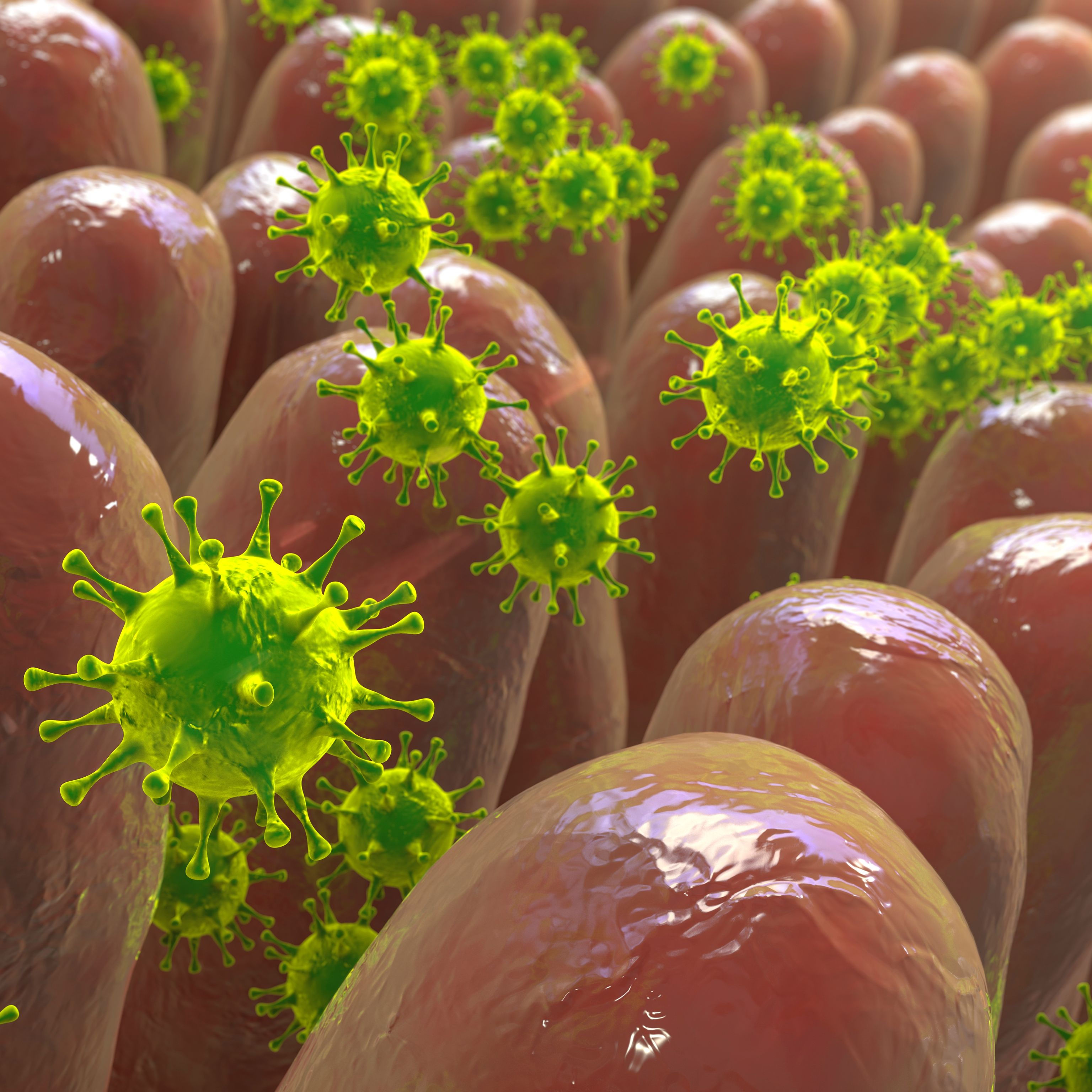
What is the astrovirus?
Human astrovirus, or HAstV for short, is an RNA virus that is widespread and a common cause of gastroenteritis. They belong to the family of Astroviridae and so far 7 different serotypes have been identified. The human astrovirus is a non-enveloped virus with positive-oriented, single-stranded RNA. It belongs to the Baltimore group IV.
The astrovirus was discovered and detected for the first time in 1975 by electron microscopy in the stool of a small child . Nowadays, it is known that astroviruses are very widespread worldwide . After noroviruses, rotaviruses and adenoviruses, they are the fourth most common cause of viral diarrhoeal diseases in young children. However, immunocompromised and elderly people are just as affected.
How common is the astrovirus?
The astrovirus can be found all over the world and is one of the most common causes of gastroenteritis, with a share of 3 - 9 %. Mostly mild, epidemic or endemic gastroenteritis occurs in young children. Epidemics are frequently reported in infant and neonatal wards, as well as in day-care centres. Local outbreaks can also occur in old people's homes or on cruise ships.
How is the astrovirus transmitted?
The most common route of transmission is the human-to-human faecal-oral route. However, the viruses, which are quite stable against environmental conditions , are also transmitted quite frequently via smear infection, i.e. through contaminated surfaces. The transmission route via contaminated food or contaminated water is also quite possible .
What are the symptoms of the astrovirus?
After an incubation period of about 3 - 4 days, the following symptoms usually occur:
- Fever,
- Nausea,
- Vomiting,
- Diarrhoea.
Dehydration is rather
rare and the disease usually progresses quite mildly within 3 - 4 days. The excretion of the astroviruses
can already take place before the first symptoms, i.e. the
affected person is already infectious, although he or she has not yet noticed the
infection.
How is astrovirus diagnosed?
The general practitioner asks about the patient's medical history and complaints on the basis of the medical history. It is also important to know whether the person has travelled recently. The frequency and the nature of the bowel movements are also important clues for the doctor. Information about sick fellow human beings in the immediate vicinity can also be an indication of infection with astroviruses .
During the physical examination of the patient, the doctor taps and palpates the abdomen to detect air or hardening in the abdomen . By looking at the condition of the skin, the doctor can see whether the patient has already lost a lot of fluid.
The reliable diagnosis of infection with astroviruses is usually not difficult. This is because a large proportion of the virus particles are excreted in the stool during the acute phase of the disease. This is why the pathogen is usually detected via a stool sample or a rectal swab. Reliable detection is normally achieved by:
- Detection of the viral proteins in the antigen-capture ELISA,
- Amplification of viral RNA by the PCR test,
- Electron microscopic visualisation of virus particles in stool samples.
How is astrovirus treated?
A causal therapy against astrovirus is currently not possible. As a rule, is a self-limiting disease and we therefore treat symptomatically. The most important thing in gastroenteritis caused by astroviruses is to drink enough fluids, mainly in the form of unsweetened tea and water. This is essential to compensate for fluid loss due to vomiting and diarrhoea. For babies, small children and older people, electrolyte powders are usually prescribed and are available from pharmacies. These are intended to prevent an electrolyte deficiency . If the symptoms last longer than 4 days and the general condition of the patient worsens, treatment in hospital may be necessary. However, this is only necessary in exceptional cases.
In addition, patients should eat light food such as soups, carrots, oatmeal, rusks and bananas . Bed rest and general rest are also recommended. For high fever or pain, a doctor may prescribe paracetamol or ibuprofen . Occasionally, a doctor may also prescribe medications that inhibit bowel activity and thus diarrhoea and vomiting.
What is the prognosis for astrovirus?
As a rule, an infection with the astrovirus runs mildly and without complications. For the most part, the disease is overcome after a few days . However, there are certain risk groups for whom the course of the disease can be severe and, in extreme cases, even life-threatening. These include newborns, infants, small children and older people as well as immunosuppressed persons. During pregnancy or breastfeeding, close monitoring by a doctor is advisable to avoid complications for the child and/or mother.
How can astrovirus be prevented?
Disinfection and other hygiene measures offer an effective prevention against astrovirus infections. Careful hygiene is essential to prevent astrovirus infection. Thorough and regular hand washing after going to the toilet is essential, as is washing before preparing food and before eating. The environment of infected persons should be kept clean, especially the kitchen and bathroom.
There is currently no vaccination against the astrovirus.
According to paragraph 7 of the Infection Protection Act, the laboratories responsible are obliged to report if the astrovirus has been detected. Here the main focus is on containing the virus in the population.
